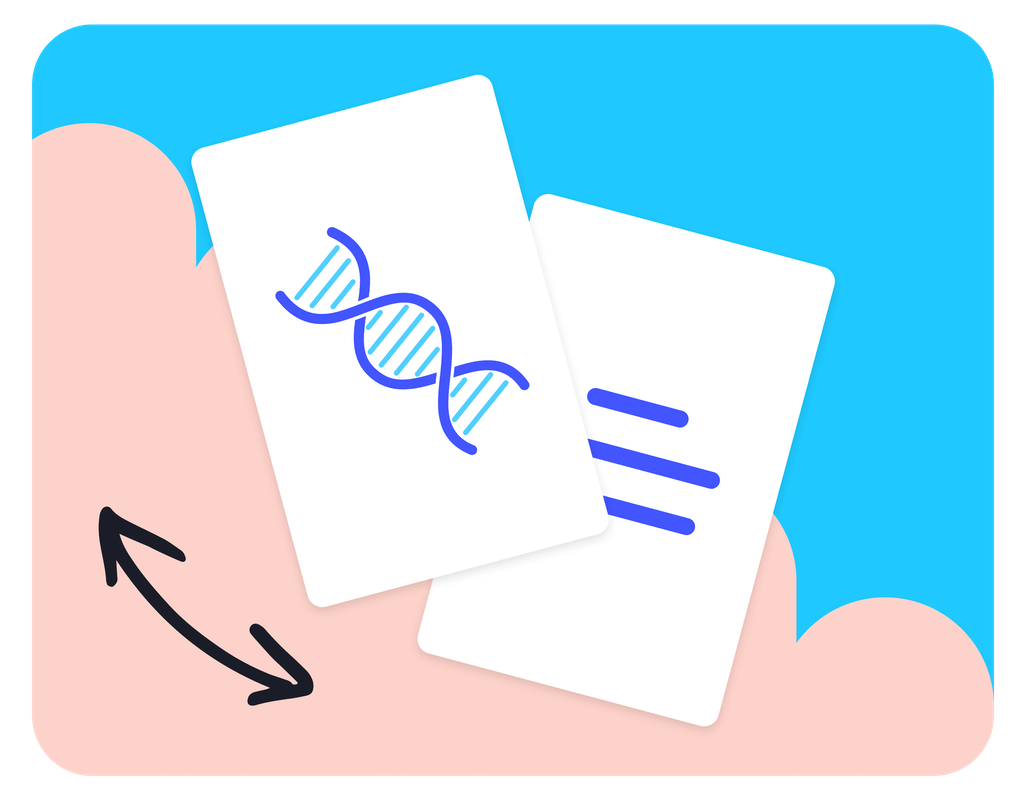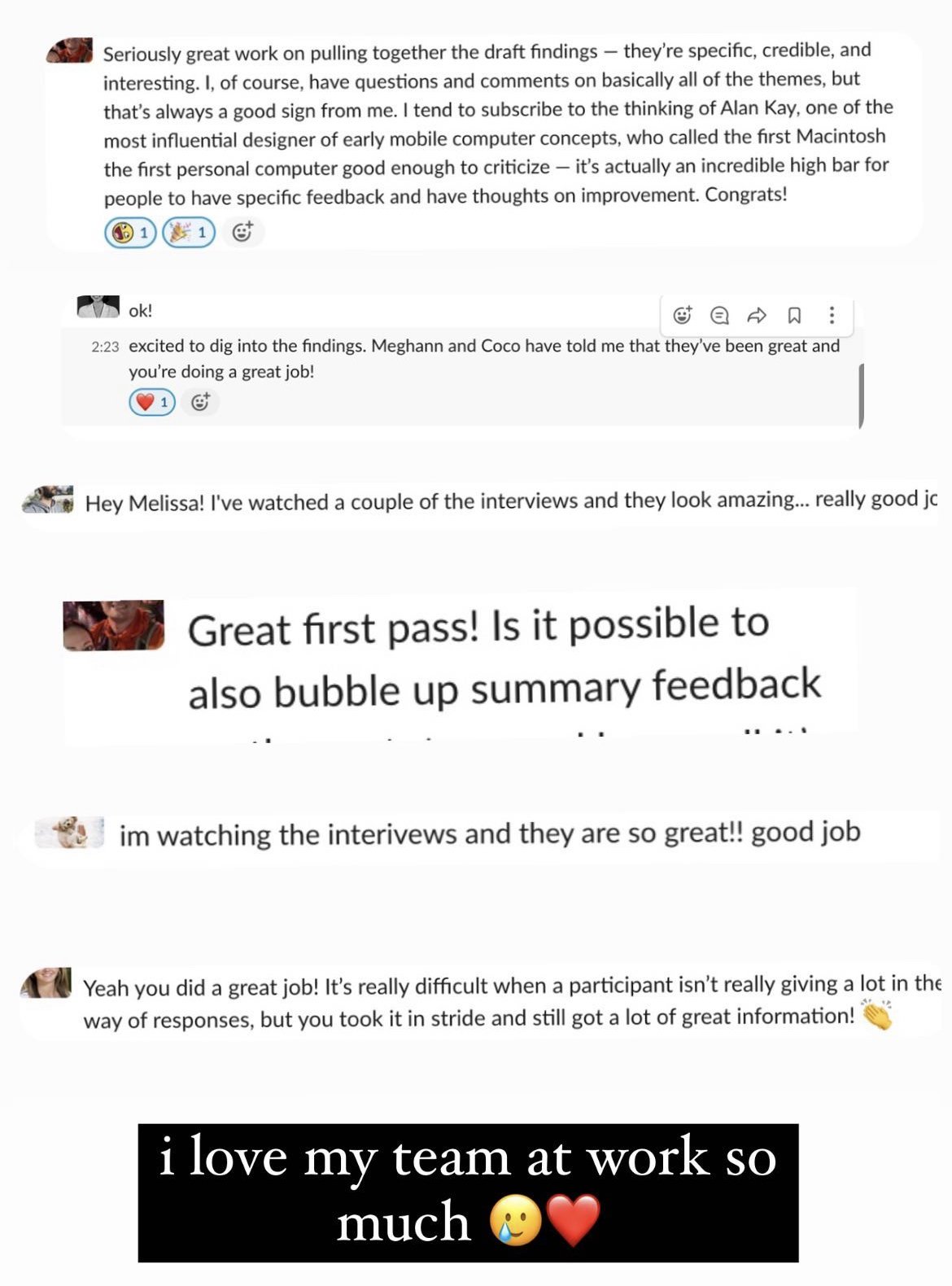
In 2021, I was a User Research Intern on the Quizlet Product team
As a user research intern at Quizlet I led two types of projects: 1) an evaluative research project and 2) a foundational/exploratory research project.
Both projects are featured here. Through these projects, I learned a wide variety of skills: conducting foundational/generative user research and evaluative research, facilitating how-might-we and co-creation workshops, and collaborating with cross functional stakeholders in design, product, and engineering!
All of my work is under NDA, so I’m only able to share limited information about this project!
Project 1️⃣
Concept testing for Quizlet Product team
Timeline: 8 weeks
Skills: concept testing, evaluative research, moderated interviews, stakeholder engagement/collaboration
Context: One of our product team’s goals at Quizlet was aiming to incorporate a new feature into the product. The goal was to conduct interviews and test prototypes created by the design team to see if Quizlet users resonated with the new feature and if this feature met their study needs. I explored students’ study journeys to learn about their study habits and get a better grasp of how this new feature could help them learn class content more effectively.
My process 🕵🏼♀️
Research Goals ❓
How might we help students navigate studying when they get stuck?
How might we optimize the product team’s features to help students learn the most important content in class more effectively?
Methods 🔎
Concept testing via moderated remote 1:1 interviews with prototypes with 6 participants
1:1 moderated interview with 6 participants
Impact 💥
Throughout my project, the product managers I worked with felt inspired by the findings that came out of the research and wanted to incorporate my findings into the product roadmap for the future.
Research findings provided product designers with a better idea of how to move forward with the design of the new product feature and will help to iterate new ideas to better serve student needs.
Facilitating the workshop with key stakeholders and cross-functional partners was a great way to inspire new ideas for product direction and strategy! The research team at Quizlet doesn’t typically facilitate stakeholder finding workshops to brainstorm insights/generate new ideas. By facilitating this workshop, I inspired researchers to consider facilitating these types of workshops more often in the future!
Learnings 🌟
collaboration can make or break the impact you have as a researcher— throughout my research project I collaborated with product managers, product designers, my research manager, and a content designer. Building relationships with my cross functional partners was a major lesson during my internship as this led my research findings to be more compelling and to have a bigger impact on the product roadmap and business strategy.
quantitative data will not always be available— one of my goals was to incorporate quantitative data into my research to further support the qualitative data. However because this feature/concept is still undergoing further development and is not yet launched, there is no quantitative data for this feature available. Because quantitative data was not available, I made sure to make the most from the qualitative data through stakeholder workshops. In the future, however, I would have triangulated both qualitative and quantitative research methods to extract richer insights.
stakeholder workshops can help synthesize your findings into actionable recommendations— I held a stakeholder workshop after collecting preliminary findings to receive feedback on how these findings could translate into product and design recommendations. During this workshop, I found that my stakeholders and cross functional partners were able to cluster these findings into themes and were then able to come up with features to prioritizes, features to be improved, etc.
Project 2️⃣
Foundational research for Quizlet’s International Markets Team
Timeline: 4 weeks
Skills: foundational/generative research, moderated remote interviews (in Spanish), stakeholder management
Context: I conducted a 4-week international foundational research study for Quizlet. For me, this was a new and challenging opportunity to conduct research that was explorative, foundational, and broad in scope.
My process 🕵🏼♀️
Research Goals ❓
The main goal of the research was to understand study journeys of university students in Mexico.
Methods 🔎
1:1 moderated interviews in Spanish (remotely via Lookback)
8 full-time university students & Quizlet users
Impact 💥
Being a native Spanish-speaking researcher helped the team tremendously because I was able to kick off research in Latin America and moderate interviews in Spanish. Because of this, the team didn’t have to hire another researcher outside of the organization to conduct research in the Latin American region.
While I had to iterate findings from research several times to make them impactful and actionable, my research findings helped to increase the company’s understanding of Mexican university students and the market for future consideration.
Learnings 🌟
Secondary research can be crucial when scoping a project
Since my research project was in the discovery phase and was broad in scope, I needed to further scope my project so I knew what types of research questions to ask and what types of interview topics/questions to ask participants. To scope my project, I conducted secondary research on the the main topic of my research (in this case, the education system in Mexico/Latin America). This helped me solidify the types of questions I asked in interviews and influenced participant criteria for recruitment.
Your insights should not be something that can be found with a quick Google Search
When I was writing the first version of key findings from my interviews I realized that they were a bit broad, as in, not specific enough. With the help of my research manager, I was able to identify which findings were the most compelling for stakeholders and which offered the most value for product direction.
Research findings are not a summary of what you have found from your research, but actionable recommendations.

quizlet swag for my first day :)

onboarding stuff :)

during back to school week, Quizlet held an event for all employees/interns and one of these activities was painting with acrylic!

great feedback on one of my projects!

